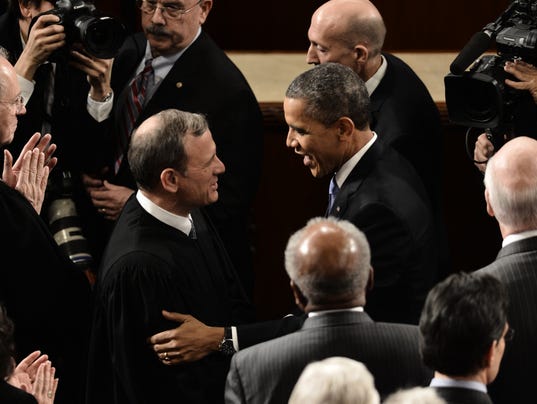The fate of President Obama's health care law depends once again on how the Supreme Court interprets what Congress wrote — a task the justices have applied literally of late to laws affecting air, land and sea.
Four words in the 906-page statute will be the focus of the high court's attention March 4, when opponents argue that tax credits received by millions of Americans are legal only in health insurance markets "established by the State."
A literal reading of that phrase would seem to exclude health care exchanges operated by the federal government in 34 states. "It's a rather difficult textual argument for the government," said Kannon Shanmugam, who has argued 16 cases at the high court.
The government disputes that interpretation, calling the four-word phrase a "term of art" that includes federal exchanges, from which more than 9 million Americans have received subsidies. Excluding tax credits in federal exchanges "was never discussed" when the law was written, said former congressman George Miller, who chaired one of the committees that wrote the law.
"It was never whispered, never," said Rep. Sandy Levin, D-Mich., who chaired the House Ways and Means Committee when the law was passed.
Nearly five years after its enactment, the Supreme Court will have the final word — just as it did in 2012, when it upheld the law by a 5-4 vote. And in a number of unrelated cases recently that offer clues to the outcome, the justices have been practicing the art of "statutory interpretation." Translation: What were they thinking?
 |
| President Obama and Supreme Court Chief Justice John Roberts in January 2013, after the court's 5-4 ruling upholding Obamacare.(Photo: Paul J. Richards, AFP/Getty Images) |
It's a question the justices have asked in cases featuring air marshals, cellphone towers, bank robbers and undersized red grouper — with mixed results. Often, plain language wins. Occasionally, the court demands context.
Taken together, the rulings and rhetoric should give Obamacare's proponents pause, for one reason: Chief Justice John Roberts — who rescued the law from being declared unconstitutional in his 2012 ruling — usually abides by the written word.Read the rest of the story HERE.
If you like what you see, please "Like" us on Facebook either here or here. Please follow us on Twitter here.




2 comments:
Also, there are 4 Commonwealths, VA,PA,KY and MA. Not sure if that would affect the SCOTUS decision on the "State" designation in the ACA.
Whats the difference between commonwealth and state?
Post a Comment